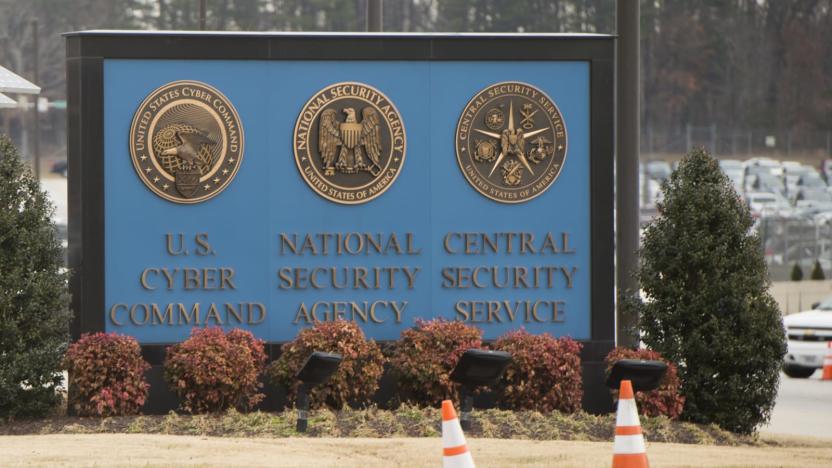metadata
Latest

YouTube rolls out hashtag landing pages to all users
This week, Google completed the rollout of new landing pages that organize videos using metadata tags.

Microsoft will identify manipulated media with a confidence score
Microsoft is rolling out new tools to combat misinformation, specifically deepfakes.

Hackers are hiding virtual credit card skimmers in image file metadata
Sites using WooCommerce are being targeted by hackers as a way to steal credit card information.

Google Assistant will finally work with business G Suite accounts
Google has been steadily rolling out G Suite updates like AI grammar suggestions in Google Docs, streamlined two-step verification, new Tasks features and shortcuts to make Google Doc and Sheet creation faster. Today, at the Cloud Next '19 event, Google announced its newest batch of G Suite changes.

DEA never checked if its bulk surveillance data was legal
If you thought the DEA's mass surveillance was irresponsible, you're not the only one. The Justice Department's Inspector General has released a report showing that the DEA "failed to conduct a comprehensive legal analysis" of three bulk data gathering programs to verify they were above board. On top of this, the policies to govern data use were either vague or non-existent, opening up the potential for abuse.

NSA deletes hundreds of millions of call records over privacy violations
The NSA unfortunately has a long history of violating privacy rules, although this time the agency might not be entirely to blame. The NSA is deleting hundreds of millions of call and text message data records (collected since 2015) after learning of "technical irregularities" that led to receiving records it wasn't supposed to obtain under the USA Freedom Act. General counsel Glenn Gerstell told the New York Times in an interview that "one or more" unnamed telecoms had responded to data requests for targets by sending logs that included not just the relevant data, but records for people who hadn't been in contact with the targets. As it was "infeasible" to comb through all the data and find just the authorized data, the NSA decided to wipe everything.

Spotify needs your help tagging and sorting tunes
Music streaming services can be frustrating if you're an avid listener, since your definitions may not line up with theirs. They may lump trance, techno and drum-and-bass into a generic "dance" category, for instance. Spotify, at least, knows it needs to do better... and it's asking you for help. It quietly launched a Line-In feature that lets you suggest edits to the metadata for artists, albums and songs. You can recommend genres, tags, moods and even nicknames. You could clarify that an "electronica" album is really tech house, or remind Spotify that many people refer to Metallica's self-titled record as "the Black Album."

Apple is assisting the UK in terror investigations
Apple chief executive Tim Cook has confirmed his company is working with UK authorities as part of their investigations into terrorist incidents. In an interview with Bloomberg, Cook said Apple was cooperating "not only in law enforcement kind of matters, but on some of the attacks." He stressed that he "cannot speak on detail," given some investigations are active, but mentioned that "in cases when we have information and they have gone through the lawful process, we don't just give it but we do it very promptly."

Google can use machine learning to identify objects in videos
You've been able to use a reverse Google search to hunt down similar photos on the internet for years thanks to image recognition and processing tools, but only for static pictures. Today, at Google Cloud Next '17, the search giant unveiled a new API that uses machine learning to search within videos for nouns and verbs occurring therein. Finally, you'd be able to hunt down that one movie about the guy who does the thing.

Edward Snowden is not a fan of Russia's 'Big Brother' bill
With Russia about to pass a law that will make it even more Orwellian than it already is, one of the nation's most famous residents has chimed in. Edward Snowden tweeted that "Russia's new Big Brother law is an unworkable, unjustifiable violation of rights that should never be signed." The NSA whistleblower added that "mass surveillance doesn't work. This bill will take money and liberty from every Russian without improving safety."

Yahoo releases content of three FBI data requests to public
Today, Yahoo made minor history by becoming the first company to publicly confirm that it has been issued National Security Letters (NSLs) from the FBI. It sounds like a simple story, but it's actually a huge win for transparency: until recently, gag orders kept companies like Yahoo from acknowledging NSLs in all but the vaguest of terms. Now, thanks to the USA Freedom Act, the company is able to divulge the contents of three FBI data requests made since 2013.

The NSA's mass US phone surveillance ends tonight
The National Security Agency's long-running mass phone surveillance program is coming to an end. As promised, the USA Freedom Act will forbid the NSA from indiscriminately collecting Americans' call metadata at midnight on November 29th. Agents will have to get court orders to collect data from telecoms regarding specific people or groups, and then only for six months at a time -- they can't just scoop up everything in case something useful turns up. The NSA will still have access to five years' worth of legacy data through February 29th, but that's as far as its access will go.

US prisons allegedly record more inmate calls than they should (update: response)
It might not just be everyday people who've been subject to illegal surveillance -- prisoners may be victims, too. An anonymous hacker has given The Intercept phone records showing that prisons have recorded "at least" 14,000 calls between inmates and lawyers through software from Securus. As you might imagine, that potentially represents huge violations of both the attorney-client privilege and Sixth Amendment protections against interference with your right to counsel. Prosecutors could use these recordings to cheat at trial by getting case details that they're not supposed to know. In fact, a recent Austin lawsuit accuses Securus of contributing to just that kind of trickery.

Judge rules against NSA's phone data collection, to limited effect
Privacy advocates just secured a victory against the National Security Agency's bulk phone data surveillance... albeit a limited one. A federal judge has ordered the NSA to stop collecting the phone records of people represented by Freedom Watch founder Larry Klayman. The US government is trampling on constitutional rights in the name of security, according to the ruling. The judge has refused to stay the order, too, so the NSA can't keep snooping while it appeals the case. There's a possibility that the government will have to pay damages, but that will hinge on a future trial.

US won't stop the NSA's mass phone spying before a ban kicks in
If you were hoping that the courts would find a way to end the National Security Agency's mass phone surveillance a little early... well, you'll be disappointed. The 2nd US Circuit Court of Appeals says it won't overturn Congress' decision to offer the NSA a 180-day transition period ahead of the USA Freedom Act's more targeted spying requirements. It's a "reasonable decision" that helps the agency keep tabs on terrorists, according to the ruling. You might beg to differ given the potential privacy violations of bulk data collection, but it's a short-lived victory for the NSA regardless -- the outfit has to scale back its snooping on November 29th.[Image credit: AP Photo/Jose Luis Magana]

AT&T helped the NSA spy on the UN's internet traffic (updated)
It's no secret that telecoms have cooperated with the US' surveillance efforts, but at least one was unusually eager to help out. Thanks to Edward Snowden leaks, both the New York Times and ProPublica have discovered that AT&T not only agreed to aid the National Security Agency's spying campaigns for decades, but has shown an "extreme willingness" to participate. It was the first to start forwarding internet metadata (like email participants) to the NSA in 2003, and was quick to offer call metadata in 2011. Moreover, AT&T helped the NSA snoop on the all of the internet traffic at the United Nations' New York City headquarters -- Snowden's leaks had previously revealed that the UN monitoring was taking place, but not the carrier involved.

NSA won't look at call metadata collected under the Patriot Act
The National Security Agency is apparently willing to make a clean break from the past now that the USA Freedom Act is forcing it to scale back its large-scale surveillance efforts. The organization now says that it won't analyze call metadata collected under the Patriot Act from November 29th onward. It'll hang on to that data for another three months for "integrity purposes" (that is, verifying that new collection techniques are working) and as long as civil lawsuits require, but the goal is to destroy that info "as soon as possible." This doesn't put an end to mass surveillance (that's still practical under the new law), but it will prevent the NSA from digging through historical info that many critics believe it shouldn't have kept in the first place. [Image credit: AP Photo/Patrick Semansky]

Report: UK cops request citizen data every two minutes
According to Big Brother Watch (PDF), law enforcement agencies in the United Kingdom have requested the personal metadata of citizens nearly three quarters of a million times in the past two years. That is, between 2012 and 2014, UK cops asked for identifying details pertaining to a text, email, phone call or search some 733,237 times. More than 90 percent of those requests were subsequently granted. That averages out to one fulfilled request every two minutes. Alarmingly, these metadata requests have only increased since 2012 with a whopping 250,000 of them coming last year alone. Even more worrisome, that BBW data originated from a series Freedom of Information Act demands and may under-represent the total number of requests actually made.

Senate blocks NSA reform bill and Patriot Act extensions
The USA Freedom Act aimed at addressing the NSA's bulk collecting of phone call metadata was approved by the House of Representatives ten days ago, but blocked by the Senate tonight (live video stream here). The Section 215 provisions of the Patriot Act used to enact the program are set to expire June 1st, and it could go away if a compromise isn't reached to extend it. Senator Rand Paul of Kentucky filibustered to push the vote to this late hour, while Sen. Mitch McConnell pushed for a series of extensions to the program, claiming the security of the country could be at risk. The Senate is taking a weeklong Memorial Day break, but will come back on May 31st for more discussion and probably more voting. The voting is done for tonight, but we expect much more discussion over the next week.

Federal court rules NSA's data collection program is illegal
The US court of appeals has ruled that the NSA's bulk phone data collection wasn't authorized under law. The metadata surveillance program has been scrutinized ever since Edward Snowden made its existence public almost two years ago. But no ruling has deemed it unlawful until now. NSA's program "exceeds the scope of what Congress has authorized," wrote one of the three judges on the panel on the 2nd circuit court of appeals.










